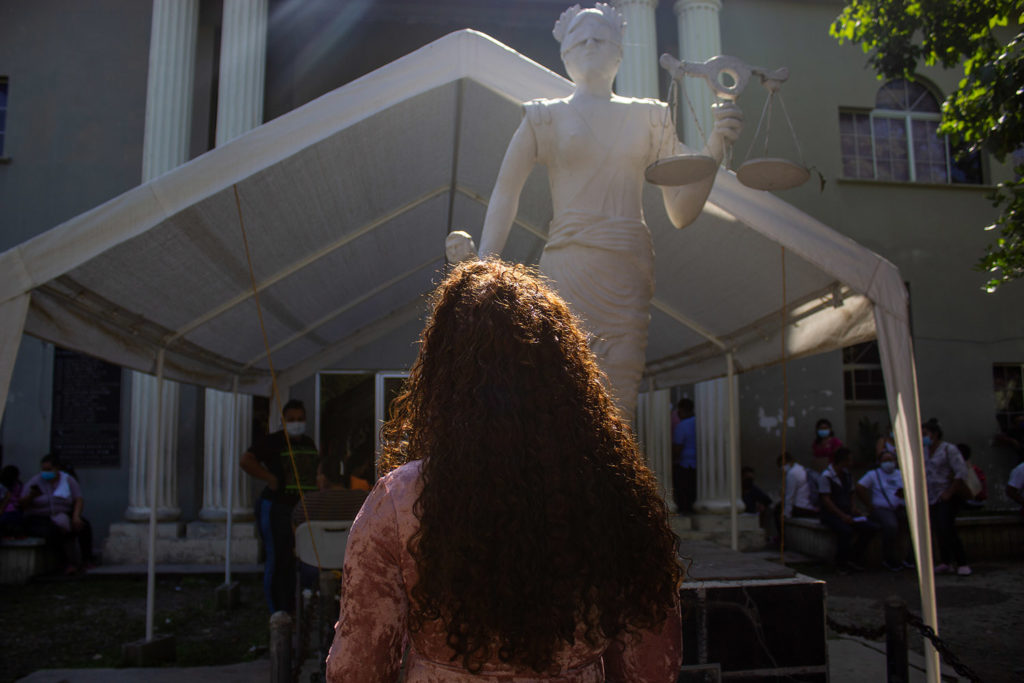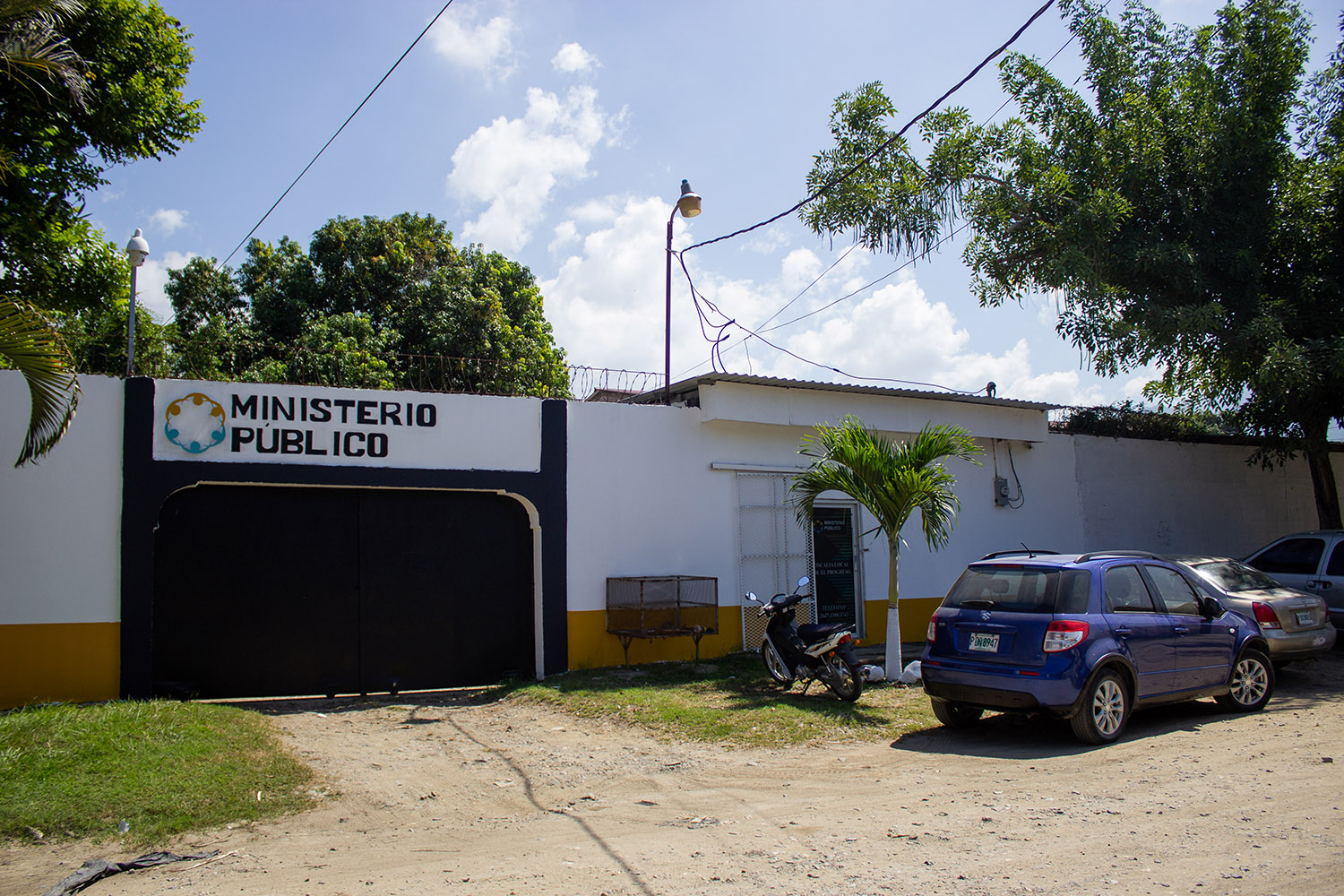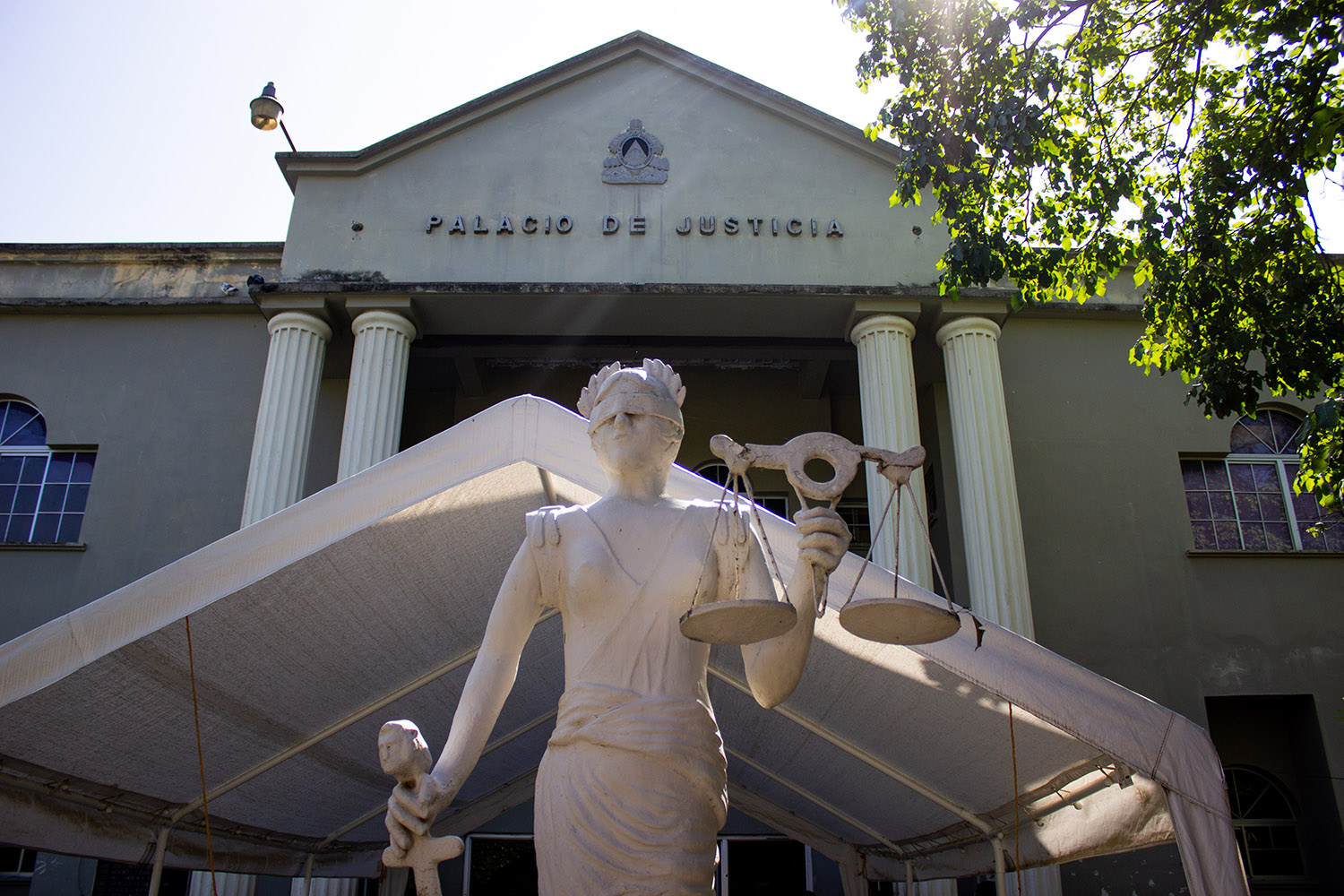Rosy Flores always wanted to be a criminal lawyer in El Progreso, a small and violent city in northern Honduras. Ten months passed before she decided to quit her job, a profession where women face a glass ceiling and threats come from all sides: from the accused but also from her fellow lawyers.
Text: Leonardo Aguilar
Photography: Antonio Gutiérrez
Translated by: Amy Patricia Morales
This report was written by the Contracorriente team in 2021 for the project Las que Huyen de Centroamérica (The Women that Flee Central America) coordinated and edited by El Intercambio.
“Rosy, there’s someone here who wants to talk to you, I have to connect you,” an inmate told lawyer Rosy Flores over the phone. That call came one day in February 2020 from the El Progreso prison in northern Honduras, where hundreds of Barrio 18 and Mara Salvatrucha MS-13) gang members are crowded together.
Remembering that day, Flores, who is 28 years old, intertwines her fingers, lacing them together. She wears large aviator-style glasses, and her curly hair is dyed red. “The other person directed a threat toward me,” Rosy says.
The criminal lawyer listened to an irritated inmate who demanded that she send an intimidating message to another person, without making any mistakes. “Deliver this message, we have your number, your location, we know your lawyer, do us this favor, don’t get into trouble,” she recalls, without elaborating on the specifics of what he said or whether she complied with his request.
Consequently, Flores stopped answering calls from unknown numbers. She began to wear hats, sunglasses, and loose clothing and committed to straightening her hair daily. She avoided as much as possible visiting the Courts, where she was recognized as the ‘colochita’ lawyer, a term used in Central America to refer to people with curls. She contemplated her mother’s situation and asked herself, “If they kill me, how will my mother cope?”
In the absence of protection mechanisms, women lawyers in Honduras survive in an environment of criminal violence, sexual harassment, and social stigmatization. “I couldn’t help but think that people might speculate about what I was doing and that’s why they had me killed,” says Flores.
After two months of straightening her hair to avoid being recognized, she made the decision to quit criminal law. She had been practicing law for ten months, in a country where her president, Juan Orlando Hernandez, was accused of drug trafficking by the New York’s southern judicial district and his brother Tony, sentenced to life imprisonment for the same offense, without ever having been tried in Honduras.
Between 2010 and 2020, Honduras recorded the murders of more than 160 lawyers. Among the worst locations to work as a lawyer is El Progreso, a city of around 500,000 people, where 97 percent of crimes against attorneys go unpunished. El Progreso was one of the five most violent places in Honduras in 2021 when Rosy shared her story with us.
In Honduras, male attorneys handle the majority of criminal cases. According to Rosy, because many of them have significant ties in the government, the prosecutor’s office, the courts, the police, and the military, they are generally not hesitant to defend drug dealers or gang members or to discontinue their relationships with them.
“Women do not have the same alliances or connections men have, given they have more opportunity to enter these spaces. And maybe not in such an honest way,” says Flores, sitting in her office, where she now works to support people persecuted by violence to obtain refuge in other countries.
In July 2013, Judge Mireya Mendoza was murdered in her pickup truck in El Progreso. More than 20 nine-millimeter shell casings were discovered by authorities at the scene. It was the latest murder of a female attorney in El Progreso.
The new girl at the firm
Some law firms got in touch with Rosy even before she graduated due to her potential as a criminal defense lawyer. When she graduated from law school, she did not realize, however, that she was entering a profession governed by impunity in the judiciary. On January 18 of that year, Congress enacted a new Penal Code that lessened the punishments for offenses involving corruption and drug trafficking.
In the same year, El Progreso had a homicide rate of 94 per 100,000 residents, 35 points above the average rate in Honduras.
In May 2019, Rosy began working in a law firm handling criminal cases. She did not earn a fixed salary, a customary and expected practice despite the professional risks of being a woman in the legal field. She noticed a sense of superiority among her colleagues since she was a recent graduate, a woman, and a young person. “They saw me as a child who was still learning,” she claims.
The people she was defending gave her disturbing looks. She recalls that despite their condescending pleasantries, she had to remain resolute. “You need to assert yourself, alter your voice and word choice, know how to interact with them, and distinguish yourself as a lawyer. When they do, they suddenly start treating you normally,” she says.
She was the youngest lawyer at age 26. The only woman. She occasionally made the trip to the capital, Tegucigalpa, to represent gang members who were charged with the murder of a journalist. She claims to have never met them or their families. “Because there you run the risk, as a woman, of a gang member feeling a physical or sexual attraction for you,” she explains.
A lack of ethics to protect confidential information, the need to be liked by judges, pressure from defendants, and the corruption of the military and police. In that order, Rosy cited the difficulties that she faced as a defense lawyer. In particular, “if the security forces have interests in a case, you will be the victim of an attack, an assassination, or some other threat.”
The influence of partisan politics is significant. A majority of the judicial employees in El Progreso were appointed by Roberto Micheletti, former president of the Legislative. In part, thanks to deputies of the governing party.
The majority of female attorneys are excluded from this power structure. Flores states that she is unaware of any organizations for female attorneys in El Progreso and provides the following justification: “There are smear campaigns against them because they are women and because they are organized.”
According to Flores, the problem facing Honduran women lawyers cannot be resolved by passing new laws but rather by educating the public through awareness campaigns: “We women must continue to fight for the respect of our lives, physical and psychological integrity, and human dignity.”
Rosy claims that even when she was leading the case, the defendants always paid more attention to the male attorneys. She spent her final two months at the firm, which she had worked at for the previous ten, avoiding the courthouse, straightening her hair and avoiding being noticed. In the same case Rosy was involved in, one of the attorneys who helped defend the gang members was assassinated a few months later.
According to the former criminal defense lawyer, a woman will allegedly be suspected of having had sexual relations with a lawyer if she is seen with him. “That affected me a lot at the beginning (of practicing),” she said, but she was able to move forward because of her reputation as a lawyer who was dedicated to social issues. She adds after two years in criminal defense, “I meant more than those remarks.”
The pressure of the courts
It is Tuesday, October 26. In a city that averages roughly 30 degrees a day, the sun is shining strongly around noon. Rosy Flores exits her car and makes her way through the busy, dusty parking lot of the El Progreso courthouse. Except for legal or familial concerns, she no longer frequently visits these facilities, but she came today because I asked her to.
Flores tries to maintain her balance among the ground’s stones while wearing heels. There are sizes of all kinds. The large ones are used as benches. Parking lines are made out of medium ones, which are about the size of a soccer ball. The most hazardous ones are the little ones, which is where Rosy walks. A sprained ankle is the result of one bad step.
There are roughly 100 individuals outside of this courthouse, including cab drivers, attorneys, prosecutors, clients, food vendors, etc. There are also masked police and military guarding. Every time she visits, Flores feels worried and tense.
The building, which is a kilometer from the prison she received the call from almost two years ago, has housed some of Honduras’ most feared criminals. A shootout took place on February 13, 2020, and it resulted in the escape of Yulan Archaga, alias El Porkys, who was rescued by a commando from his gang, MS-13, and was listed by the US FBI as one of the top 10 most wanted men.
The entryway to the courthouse, which has peeling walls and hasn’t had its paint touched in years, still has the gunshot marks from El Porkys’ escape.
Currently, there is an order to remove all files from the building, and all employees to be evacuated gradually. The structure has significant fissures, and given recent seismic activity, there is a possibility that the entire building could collapse.
Rosy obliges us by taking a picture in front of a crumbling statue of the goddess Temis outside the courthouse. Temis represents justice. We agreed to remain outside and refrain from entering, but inside the courthouse, everything is fair game, including the intimidation of judicial civil servants by attorneys with access to financial resources and armed gangs. They are yelled at, insulted, and receive death threats.
Some lawyers have opted to accept bribes and justify it as a protection mechanism. Many of them are frequently exposed on social media for their corruption as justice administrators.
In 2009, Honduras experienced a coup d’etat. Following the coup, judicial independence weakened as the Executive and Legislative bodies continued to interfere with the courts.
Judges who rebel against the system are confronted with disciplinary retaliations. In Honduras, there were 77 dismissals and firings of judges and judicial employees, between 2014 to 2017 (there are no statistics prior to these dates), according to the Association of Judges pro-Democracy (AJD).
Without any protections, judiciary employees are exposed to violence and political interference.
Some of them shamelessly provide confidential information to gangs, law firms, police, and the military. “As soon as a lawyer submits a power of attorney to represent a client, information starts to flow,” says Flores.
The lawyers use this information to find customers as if it were a market of goods to be exchanged or bought. The police then use it to conduct a vox populi within the penal institution. “Inside the prison facility, the defendants are aware of all judicial proceedings. They mutually agree to recommend each other’s lawyers,” she recounts.
Within the El Progreso courts, there’s a formulated strategy for obtaining favors, discounts, and profits. An exchange of information, warns Flores, is based on the pursuit of interests.
Whoever goes against the system is disposable.
The colocho (curly) hair
That same Tuesday after visiting the courthouse, we entered a cafe with tables placed in a galley. In front of us, there’s a patio covered in grass, palm trees, a pool, and flowers. We do not order coffee because there is no electricity and the machines cannot operate. They brought us lemonade instead.
Power outages are routine in Honduras- where Colombian companies, contracted by the Honduran State, interrupt its services daily, with outages lasting as long as 8 hours—–. We can hear the sounds of the cars outside. Conversations contrast the silence inside.
Upon asking Rosy what she felt after our visit to the courthouse, where men threw disturbing looks her way, she responded she felt a familiar discomfort. “Immediately on arriving, I felt the tension that lingered in the air.
Flores left her job at the law firm a month before Honduras registered its first COVID case in 2020. When courts and tribunals were closed, independent attorneys, like Flores, were left without salary. In the final months of that year, two hurricanes, Eta and Iota, hit the northern zone where El Progreso is located.
In this context, Flores began studying for a year. She had time. She received two diplomas in human rights. She was trained in intellectual property, constitutional rights, and the impact of new regulations enacted by Congress. After graduating, she discovered she wanted to serve as “an advocate for displaced lives” she says.
In mid-2021, Flores began working with a consortium of national and international organizations, to accompany people at risk from violence. “The pressure and responsibilities are enormous in this role, however, the risk can be managed more privately. There are existing confidentiality agreements.
How long has it been since you’ve used your hair straightener? – I asked Rosy.
—-It’s been more than a year—she responds, confused by the question.
—Are you planning on using it again? – I ask.
——I hope that if I use it again it will be for pleasure and not to protect my life,” she answers, laughing.
It’s Wednesday, November 24th of 2021. 4 days until the general elections. Our conversation takes place behind her shielded office door. She is in a hurry because she has to prepare for the potential violence on election day.
In the last two elections, there were bloody protests over election fraud, where businesses were looted and protesters faced brutal crackdowns by security forces. After the 2017 elections, at least 20 protesters were killed by police and military, according to data by the United Nations.
-And if there is another fraudulent interference, will you come out to protest? -I ask her.
-Of course I will. There is no other way.
A month before I asked her if she had ever thought about fleeing Honduras. She firmly said yes.








